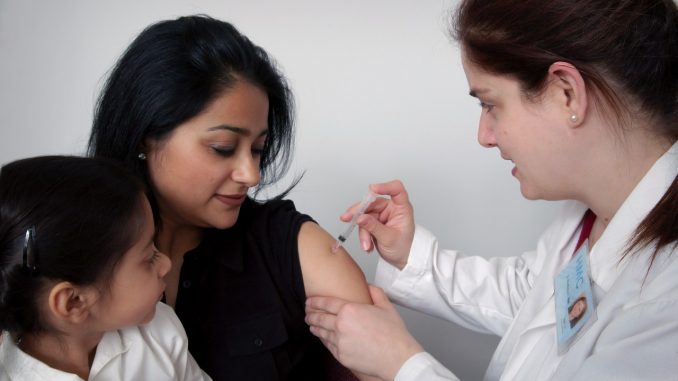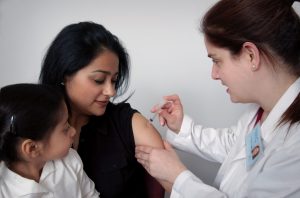

Does the thought of getting a tetanus booster leave you quivering? If you despise needles and avoid them at all costs, you are far from alone.
How can you overcome your fear of needles? It helps to understand what beliefs and thoughts drive your behavior when you cancel that doctor’s appointment at the last minute. Once you know what triggers you, the techniques below can help you quell your anxiety.
Why Do People Fear Needles?
Trypanophobia is the fancy term for fear of needles. While many children overcome their anxiety as they age, some adults continue to struggle with a severe aversion.
The fear of needles can stem from many causes, such as:
- Negative past experiences: If a newbie phlebotomist once made your arm black and blue from shoulder to wrist, you might hesitate to get stuck again.
- Transferred phobias: If your mom reacted to needles by swooning, you might imitate her behavior. Also, if you recently read an online story about someone contaminated by a needle, you might feel hesitant.
- Changes in brain chemistry: Some medications or traumatic brain injuries can amplify the panic response.
- A sensitive temperament: Some folks are more inherently sensitive than others. If you are among them, what feels to some like a little prick may be the equivalent of a stabbing.
It’s critical to note that physicians use various types of needles today. Newer, butterfly-style versions enable phlebotomists to use a close grip for precise injection into a vein. This technology is a vast improvement over earlier models that required steadier hands.
If your first experience with needles occurred before 1980 when you needed a rabies shot, no wonder you now flee in terror at the thought of injections. Rest assured that today’s methods are far less painful and intrusive.
Like it or not, you need to get your shots. What can you do to reduce your fear? The seven tips here can help.
1. Request the Smallest Gauge
The smaller the needle, the more it minimizes pain — as long as it delivers the medicine. It’s OK to ask your provider if they can switch to a tinier gauge. They will inform you if it’s unsafe.
Keep in mind that higher gauge numbers mean a smaller diameter. Therefore, if your provider agrees to switch from a 28-gauge to a 30-gauge, you experience less unpleasant stinging.
2. Speak Your Needs
If you tend to pass out when you get injections or a blood draw, let your provider know. Most of them will lie you back in a comfortable cot to prevent injury if you lose consciousness.
Consider the situation from their perspective if you feel embarrassed about addressing your needs. They don’t want to pluck you from the floor or worry about a lawsuit if you bump your head. By informing them you have an issue, you also save them unnecessary angst.
3. Look Away
It sounds simple, but if you grew up in a family where squeamishness was treated like a flaw, you might feel like you have to “tough it out” and watch your injection. It’s time to forget that nonsense.
It’s natural to pull away from a foreign object piercing your skin. It’s a survival mechanism — you wouldn’t live very long if poking holes in your body were fun. Feel free to turn your head.
4. Bring a Companion
The buddy system works for many things, including conquering the fear of needles. Bring a friend or partner along to hold your hand.
With COVID-19 social distancing rules, you might hesitate to hold hands with a nurse attendant. However, if you both wear gloves and wash your hands afterward, you should be OK.
5. Surf Social Media
It helps to distract yourself from unpleasant sensations — it’s why you wear headphones on the treadmill at the gym. You might even trick your brain into looking forward to your injections with this trick.
Instead of focusing on the needle, think of your appointment as a break. Use the time to get deliciously lazy and surf silly memes free from nagging thoughts of “I should be doing something productive.”
6. Ask for Sedation
If you have severe trypanophobia, the attendant might have to restrain you, at least partially, to get a blood draw. Unfortunately, this restriction can further traumatize you and make you resist further testing needs.
Instead, why not ask for a sedative? Newer drugs mean doctors don’t have to rely on potentially addictive benzodiazepines, and practitioners prefer volunteer methods over intrusive restraints.
7. Involve a Therapy Pet

The simple act of petting a furry creature invokes the automatic relaxation response and calms your nerves. While relatively few providers have therapy animals on-site, you can inquire about bringing your well-behaved, licensed pet.
If they respond with, “Sorry, no dogs allowed,” consider bringing another comfort object. You might feel odd carrying a stuffed hippo into your appointment as an adult, but take it anyway. If you have kids in tow, folks will assume you’re carrying it for them.
Overcome Your Fear of Needles With These 7 Tips
Injections and blood-draws scare many folks. However, you can overcome your fear of needles by understanding your hesitation and using these seven helpful techniques.

